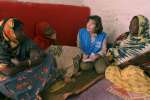- Text size
 |
|  |
|  |
| 
- عربي
Chinese actress seeks to build bridges with Somali refugees
News Stories, 10 April 2012
JIJIGA, Ethiopia, April 10 (UNHCR) – Chinese actress Yao Chen has concluded her first visit to Africa as UNHCR's honorary patron for China by hailing the courage of Somali refugees and the generosity of their hosts in Ethiopia.
Yao Chen travelled to Ethiopia last week to meet with Somali refugees in the Dollo Ado and Jijiga border areas. "I felt this situation deserves particular attention. These refugees need help now, this is where the needs are the greatest," she said. "We hear about the drought, famine and suffering of people in the Horn of Africa from the news, but I wanted to see the situation with my own eyes."
Of the three camps she visited, Aw Barre and Sheder in Jijiga were opened in 2007-2008 for Somalis escaping insecurity back home. Buramino is the newest camp in Ethiopia, established just a few months ago with four other camps in the Dollo Ado region to accommodate some 150,000 refugees fleeing conflict and drought in Somalia.
In Buramino camp, Yao Chen spoke to a mother of five who had come from the Somali capital, Mogadishu, several months ago. Sitting in a small Somali shelter made of wood and rugs, the woman said that leaving Mogadishu was the only way to save her children's lives. One daughter, aged 14, suffers from epilepsy while another, 13 years old, has diabetes and needs daily injections of insulin and medical care. Their eight-year-old brother has heart problems.
Back in Somalia, the family was displaced and medical services were not available in a city torn by fighting. Now in Buramino camp the family relies on the help of UNHCR and its partners who drive about 30 kilometres every day to deliver medicines and injections in a cold box to the girl.
After spending an hour with this family, Yao Chen said, "I am impressed by this mother who struggles for the survival of her children, but I can see that they are exhausted, all their thoughts are just about survival in this very harsh climate."
Visiting UNHCR-supported schools in the camps, she asked children how they go to school and what they study. She also asked women about the possibilities of study and work.
In Jijiga, she met with a group of young refugee women from Aw Barre, Kebribeyah and Sheder refugee camps, together hosting more than 41,000 Somali refugees. Some of these women were born in the camp, while others came as refugees with their families four to five years ago.
Considering the high drop-out rate among girls, these young women are considered very privileged: They managed to finish secondary school in the camps and received UNHCR scholarships for tertiary education.
The UN refugee agency sponsors about 50 refugee women to study in local colleges in Jijiga. The women will become medical nurses, public service managers and teachers, professions which are in demand both in the refugee camps and in the local community.
"Education is key to your future, this is your pass to success in life," Yao Chen told them. "It gives you skills and independence. This also enables you to help other refugees and host communities."
One of the women she spoke to in Aw Barre camp was a mother of five whose husband and other three sons were killed in Mogadishu and who arrived in Ethiopia two years ago. She told Yao Chen that her wish was to have better lighting in their tent so that the children could study and read in the evening. "This family suffered a lot, they lost their loved ones but I could see hope in their faces, I see this woman so committed to educate her children and give them a chance for a better life," noted the actress.
Inspired by her talks with the refugees, she said, "My trips with UNHCR make me reconsider my life, my values, they change me as a person. I feel I have to do something for refugees, I feel it as my responsibility now. For a week I forget about my work, I serve as a volunteer."
Te actress added that she came "to support UNHCR and tell refugee stories to the rest of the world. I will share the stories I heard and the photos from the camps and will call upon people to support UNHCR and refugees."
Through her very large and powerful Weibo platform – she is known in China as the "Queen of Weibo", the Chinese equivalent of Twitter – Yao Chen regularly reaches an audience estimated at 20 million followers. She also brought several journalists who will help her to raise awareness about the humanitarian needs of refugees in mainland China, Hong Kong, Macao and other parts of the Chinese-speaking world.
"The people of Ethiopia are so generous to refugees," she said. "They keep their borders open, they share whatever they have, though it is not the most developed or richest country in the world. This really impressed me, some people have so little but still do not hesitate to share it with others."
Ethiopia hosts more than 308,000 refugees from different countries – the largest groups being Somalis, Eritreans, Sudanese, South Sudanese and displaced people from Kenya.
By Natalia Prokopchuk in Jijiga and Dollo Ado, Ethiopia
















































